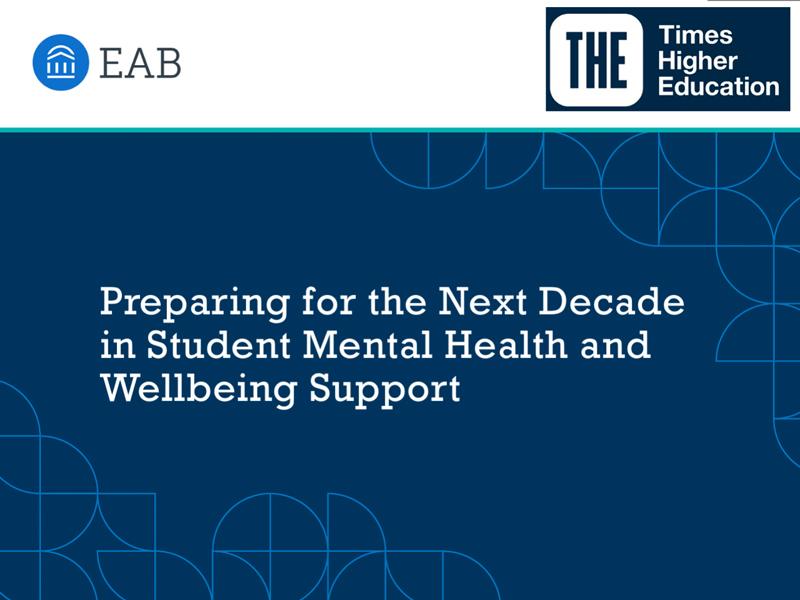
Tackling the campus mental health crisis has to be a team sport

You may also like
Higher education institutions are continuing to struggle with the rising mental health needs of their students. Since 2014, the share of college students experiencing depression has risen from 21 per cent to 41 per cent. Students reporting symptoms of anxiety rose from 20 per cent to 36 per cent. At the same time, half of students with mental health conditions have never used any campus counselling services. Just two-thirds of students say they know who and where to turn to when experiencing a crisis.
This rise in mental health concerns comes at an especially challenging time. Institutions are having trouble finding enough health professionals to hire, existing staff are experiencing immense burnout and counselling centres are seeing unprecedented turnover among their directors. A growing number of institutions are augmenting their mental health services by partnering with online providers, but gaps in care continue to persist.
College leaders are going to have to get even more creative to fill these gaps – but they won’t have to look far to find one possible solution. While the expertise and experience of qualified mental health professionals are irreplaceable, institutions can tap into their faculty and staff to create an environment that proactively supports the well-being of all students. Providing coaching and training to the people who support and interface with students every day must be a crucial part of the solution.
As it turns out, many students already expect a range of college employees to play a role in helping them with their mental health challenges. According to a survey conducted earlier this year by Inside Higher Ed and the consultancy College Pulse, nearly half of students say they believe professors are responsible for helping them when they are struggling with their mental health. An earlier survey carried out during the pandemic found that students relied on their professors for mental health assistance at the same rate they relied on official campus health services.
Other research suggests that members of faculty are frequently thrust into the gatekeeper role of identifying when students are in distress and connecting them to other resources. Unfortunately, they too often serve in this capacity without the proper training. While about 80 per cent of faculty members report having one-on-one conversations with students regarding their mental health, just half feel as though they have a strong sense of how to recognise when a student is struggling. Three-quarters of faculty would welcome professional development around student mental health, with nearly two-thirds believing it should be mandatory.
- Resource collection: Using data to support student success
- Resources on mental health and well-being in higher education
- Creating safe spaces for students to talk about financial difficulties
Some colleges and universities have begun to explore ways of providing faculty and other campus workers with training that can bridge the divide between their care for their students and their mental health expertise. At the University of North Carolina, for example, more than 900 faculty and staff have received coaching through mental health first-aid, a US skills-based training programme that teaches participants how to identify and respond to mental health and substance-use issues. Since 2020, Pennsylvania State University has offered training through its Red Folder initiative. Last year, Harvard University adopted a similar programme called Crimson Folder.
Institutions are also investing in training to help staff gain a deeper appreciation for how issues such as trauma and toxic stress can manifest in ways that affect studies. Equipped with this stronger understanding, faculty and staff can better address any obstacles that might stand between students and their education and career goals. At Philadelphia’s Peirce College, for instance, staff receive professional development to help them forge stronger relationships with the students they serve by foregrounding their emotional well-being. Funded by a grant from the U.S. Department of Education’s Predominantly Black Institutions (PBI) Program, the initiative empowers staff to navigate challenging conversations around trauma and stress more productively and with greater empathy.
These are just a few examples of how institutions are building campus communities where students feel supported anywhere they turn. According to research from Uwill, an online mental health provider that partners with colleges across the country, social isolation and loneliness rank among the most common mental challenges students are struggling with. Creating a culture that prioritises students’ well-being means ensuring they know they are not alone and that they can easily find a helping hand or caring ear.
At the end of the day, faculty and staff are not a substitute for skilled, licensed mental health professionals. With the right training, however, they can serve in a valuable preventive role and as critical first responders. They can identify when students need assistance and point them toward campus resources that can address their physical and mental well-being. Tackling the campus mental health crisis requires a collaborative approach with healthcare providers, student support professionals and educators working together. Indeed, at a time of such acute need and stretched capacity, every member of a college community has a role to play in supporting the mental health of its learners.
Ruth Bauer White is the president of InsideTrack.
If you would like advice and insight from academics and university staff delivered direct to your inbox each week, sign up for the Campus newsletter.


